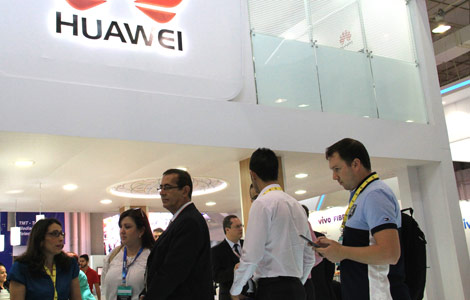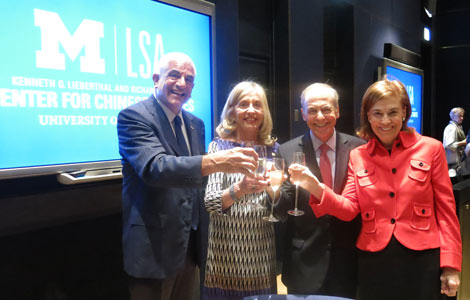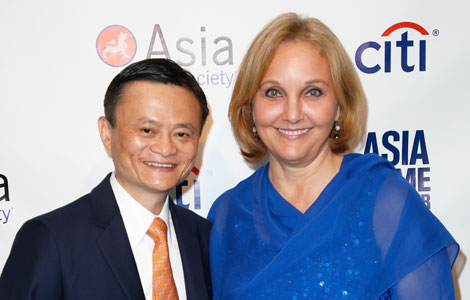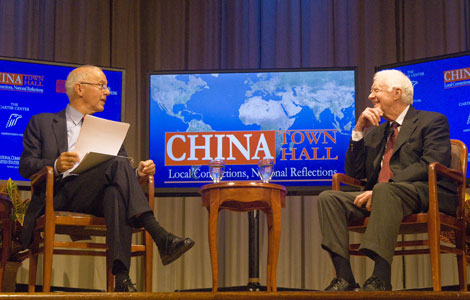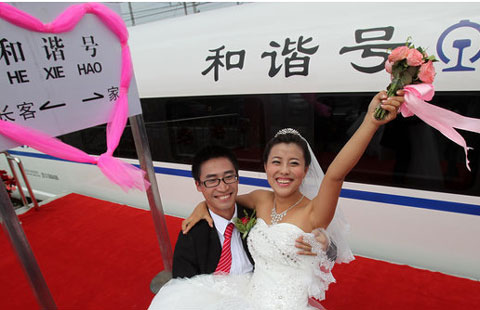China-US summit will echo Sunnylands meeting
Updated: 2014-10-17 06:41
By CHEN LONGXIANG(China Daily USA)
|
||||||||
The meeting between Chinese President Xi Jinping and US President Barack Obama on Nov 12 after leaders of the Asia-Pacific Economic Cooperation group meet in Beijing will capture global attention.
The two heads of states will reaffirm their commitment to working jointly to build a new model of major country relations between China and the United States, which features no conflict, no confrontation, mutual respect, cooperation and common prosperity.
"Beijing will prepare for a Chinese-style meeting between President Xi and President Obama, displaying the summit diplomacy with Chinese characteristic," said Chen Xiangyang, a researcher at the China Institute of Contemporary International Relations. Preparations are in full swing for the talks, yet the specific venue and form have not been announced by the host.
In a statement to the US-China Strategic and Economic Dialogue in July, Obama said he looks forward to addressing all of the issues with Xi when visiting Beijing for APEC in November. The trip will be his second visit to China.
"The one-day meeting between the two heads of state, which echoes their informal summit at the Annenberg Sunnylands retreat in California last year, coincides with the US side's expectation," said Shen Dingli, a professor and vice-dean of the Institute of International Affairs at Fudan University. Robert Wang, the senior US State Department official responsible for APEC, said the US believed the informality of the summit at Sunnylands last June had been "an effective way of doing things".
This year marks the 35th anniversary of the establishment of diplomatic relations between China and the US. "The 40-odd years of China-US interactions have repeatedly proved that leaders' meetings have been a forceful driver in promoting bilateral relations," said Zhou Wenzhong, who served as Chinese ambassador to the US from 2005 to 2010, citing Richard Nixon's visit to China and Deng Xiaoping's visit to America in the 1970s.
"At the time of an eventful international situation, making arrangements for the meeting is of great significance. The meeting itself is an embodiment of joint efforts in building a new model of major country relations and will further expand consensus on these efforts and enrich the connotation of the new model," said Chen.
"The two heads of states will ‘set their watches' over bilateral relations, Asia-Pacific affairs and international hotspot issues and advance cooperative efforts in implementing the important consensus reached between them last year," Chen said.
"The upcoming informal meeting is a good opportunity for the two sides to work together to maximize cooperation and minimize differences in bilateral relations and regional affairs to reverse the scenario that disputes and incidents occurred from time to time in areas such as cyber security, military encounter in the sea and tensions in both the South and East China seas since their last meeting," Shen said.
"In the multilateral arena, if cooperation can be further promoted in fighting against the deadly Ebola virus, regional security issues, global terrorism and climate change, it would be better for the building of a new model of major country relations between China and the US," Shen said.
"The significance of building a new model of China-US relations has gone beyond the bilateral dimension and assumed regional and global strategic importance," Chen said. "Whether the two countries can develop a new type of major-country relationship has a far-reaching impact on the interests of all countries in the Asia-Pacific region."
"As the most important Asia-Pacific countries, it is natural that there is competition for influence in the framework of APEC. But it has been proved again and again that smooth cooperation of the APEC and sustainable prosperity of the Asia-Pacific economy to a large extent depends on the common leadership of both China and the US," said Chen.
"As China continues to rise rapidly, ‘host-country diplomacy' will be all the more carried out on a regular basis. China cannot conduct foreign policy on the principle of keeping a low profile, but to constantly put forward cooperation initiatives regarding international governance and put forward China's blue prints for maintaining regional stability and global prosperity in a more active way on the international stage," Shen said.
"At the APEC meeting, China will put forward a string of proposals concerning Asia-Pacific economic integration, coordination of the process of the free trade area of the Asia-Pacific, construction of the Silk Road Economic Belt and the 21st Century Maritime Silk Road and the stability of the Asia-Pacific security pattern, and announce the establishment of the Asian infrastructure Investment Bank," he said.
"At the same time, on the multilateral diplomatic platform China should seize the opportunity to vigorously carry out bilateral and trilateral diplomatic activities. When conditions permit, or are roughly ripe, it would be better if Chinese and Japanese leaders can hold a bilateral meeting, and leaders from China, Japan and the Republic of Korea have a trilateral one," said Shen.
Xinhua contributed to the article.
chenlongxiang@chinadaily.com.cn
Most Viewed
Editor's Picks

|

|

|

|

|

|
Today's Top News
Xi, Hollande exchange congratulatory messages on cultural events
Huawei shows products on Brazil exhibition
Former Brazilian ambassador to China expects stronger ties
Writer Lu Xun's works honored in NY
Premier Li outlines his Eurasian blueprint
Work completed on satellite launch center in Hainan
Barricades in HK removed
Well-heeled travelers eye LatAm
US Weekly

|

|
